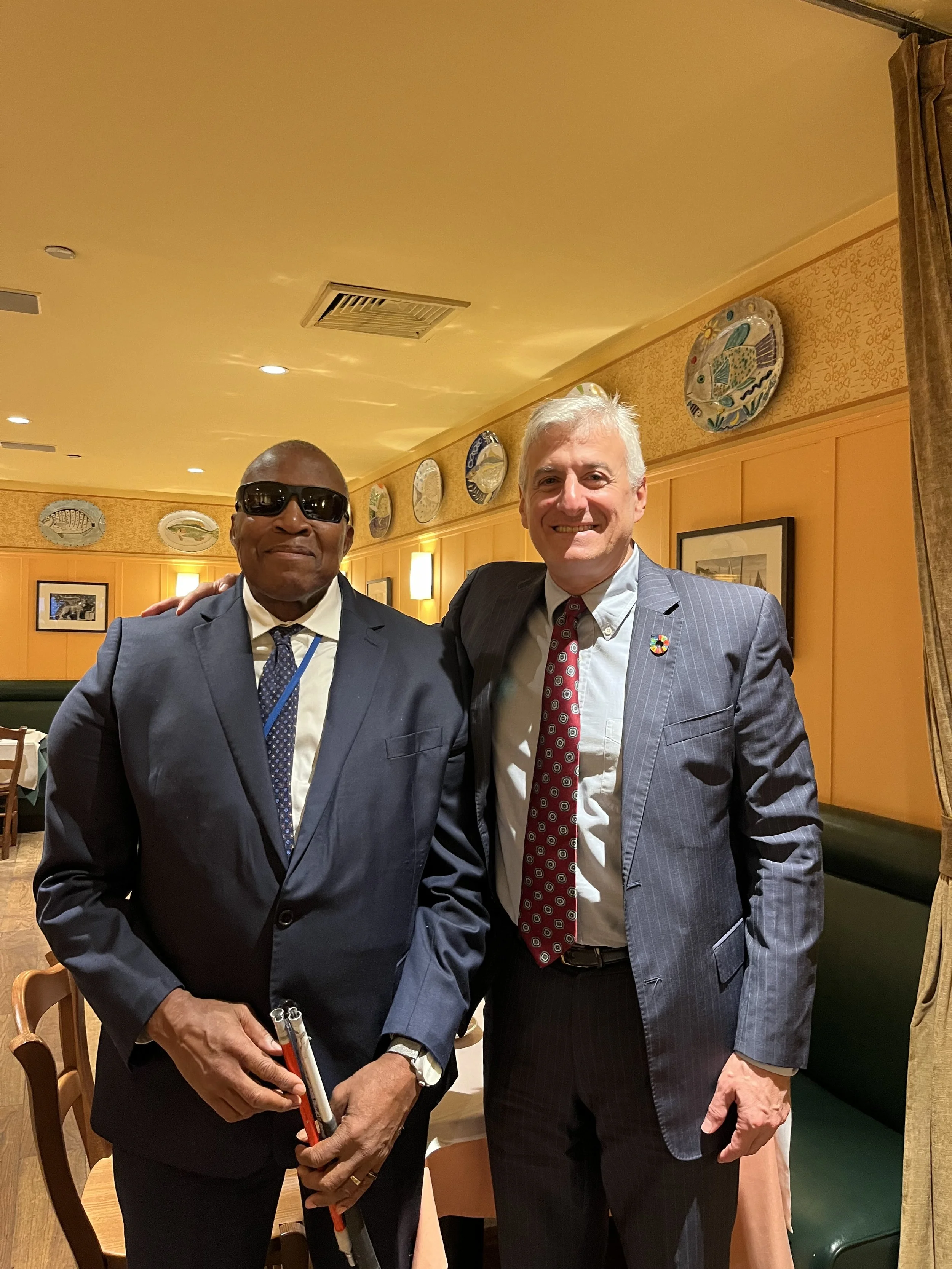A True Visionary
Vision isn’t always defined by sight.
Antigua and Barbuda’s UN Ambassador Dr. Aubrey Webson, who was born blind and is a champion of eye-health-related issues, is one of the most visionary leaders in his diplomatic cohort.
Antigua and Barbuda UN Ambassador Dr. Aubrey Walton Webson, left, with Brooklyn Story Lab CEO Lance Gould.
His journey began humbly, facing great adversity, yet he transformed his challenges into opportunities. Born in Antigua and Barbuda, his family and the government of Antigua and Barbuda moved him to Trinidad and Tobago for education. Later, as director of international programs for the Perkins School for the Blind just outside Boston, he led efforts to establish equal rights for students with visual impairments across the developing world.
Globally, 1.1 billion people experience vision loss, primarily because they do not have access to adequate eye care services. Most sight-impaired people live in low- and middle-income countries, where support and services are less accessible.
One remarkably helpful tool in leveling the playing field is Braille, the tactile representation of alphabetic and numerical symbols using six dots to represent each letter and number, and even musical, mathematical and scientific symbols, which was invented by the 19th century French educator Louis Braille.
Remarkable Moment for Braille
This is a remarkable moment for Braille, as it is now possible to wed Braille and technology and aid the vision impaired like never before.
“There is a lot of discussion around Braille and technology,” notes Dr. Webson. “Braille and technology go hand in hand, where together the two can instantly — and quite literally — put information at the fingertips of those with visual impairments. With Braille, the visually impaired can have instant access to information produced by the wonders of technology. Access to Braille allows the individual who is blind independence to be ready from bottles or jars with markings such as medications. One critical thing that teachers often say to the student who is a ‘Braille reader’ is that Braille helps the visually impaired learn the true spelling of words — as words aren’t always spelled the way they sound.”
Tomorrow (January 4) is World Braille Day, a day established by the United Nations in 2019 to honor the legacy of Louis Braille on his birthday.
Ambassador Webson’s impressive body of work is not limited to seeking eye health for all those combating blindness everywhere in the world. He has dedicated himself to uplifting communities, strengthening the social and economic fabric of individuals and of his island, advocating for social justice, and championing environmental and development sustainability for persons with disabilities and persons in poverty. He has also been a tireless advocate for SIDS (Small Island Developing States), and co-chaired the United Nations resolution on the Multidimensional Vulnerability Index (MVI), bringing that resolution closure after 30 years.
In 2022, Ambassador Webson received the Louis Braille medal for outstanding service to the global blind community — just the fourth time the award was bestowed in its 50+-year history, and the first time it was awarded to a person of color.
And in 2024, he received three more honors, from such esteemed bodies as the University of the West Indies (Honorary Doctorate in Laws); the International Council on the Education of Children with Visual impairment (ICEVI) in India (lifetime achievement for contribution in the education of children who are blind and those with deaf blindness); and Case Western Reserve University in the United States (induction into their Hall of Fame in Ohio).
He has often said that his voice is a voice for the “silent ones” — the voiceless. On World Braille Day, we salute his advocacy for giving voice to the voiceless — and vision for the sightless.

